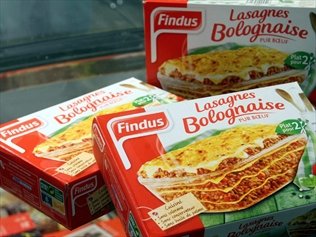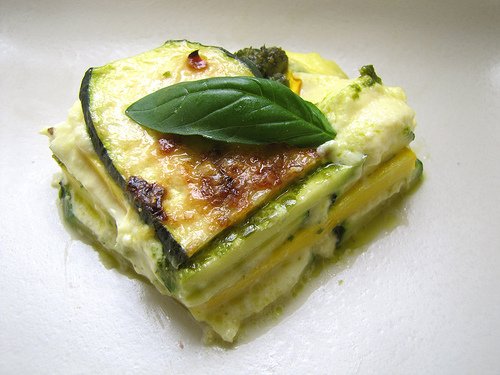Horsemeat has been detected in frozen lasagne on sale in Germany and supermarkets have started removing the product from their shelves.
Real supermarket chain said it had withdrawn TiP frozen lasagne – the latest tainted processed food to figure in a Europe-wide scandal.
Other German retailers including Tengelmann and Rewe are now checking their processed beef products too.
The EU Commission is urging member states to conduct random tests for horsemeat.
All EU members should carry out DNA tests on processed beef for traces of horsemeat for three months from March 1, the health commissioner said on Wednesday.

Horsemeat has been detected in frozen lasagne on sale in Germany and supermarkets have started removing the product from their shelves
The EU has outlined an “intensive monitoring plan” to tackle the widening scandal over mislabeled horsemeat.
All members would be asked to carry-out random DNA tests on beef products for traces of horsemeat for the next three months, the health commissioner said.
He was speaking after a crisis meeting with ministers from the UK, France and other affected countries in Brussels.
“This is a Europe-wide issue that needs a Europe-wide solution,” Irish Farm Minister Simony Coveney said.
“This is about someone in the food supply chain selling horsemeat as beef and making money in a fraudulent way by doing that,” Simony Coveney added.
EU Health Commissioner Tonio Berg also said a separate programme of random tests should be carried out on horsemeat to check for the presence of the veterinary medicine phenylbutazone – known as bute.
The measures follow the discovery that meat sold in up to 16 European countries labeled as beef contained horsemeat.
The scandal has raised questions about the complexity of the food industry’s supply chains across the 27-member EU bloc, with a number of supermarket chains withdrawing frozen beef meals.
In the UK, the supermarket giant Tesco, frozen food firm Findus and budget chain Aldi received horsemeat-tainted mince from Comigel, based in north-eastern France.

The EU has outlined an “intensive monitoring plan” to tackle the widening scandal over mislabeled horsemeat
Horsemeat has now been confirmed in some frozen lasagne on sale in France too.
In Germany, officials announced that a shipment of frozen lasagne suspected of containing horsemeat had arrived in the country. They were notified of the delivery by authorities in Luxembourg on Tuesday.
Comigel denied wrongdoing, saying it had ordered the meat from Spanghero, a firm in southern France, via a Comigel subsidiary in Luxembourg – Tavola.
The supply chain reportedly led back to traders in Cyprus and the Netherlands, then to abattoirs in Romania.
There are now calls for more specific labeling on processed meat products in the EU, to show country of origin, as in the case of fresh meat. But the cost of doing that may trigger opposition from food manufacturers.
Romania has denied claims that it was to blame for the mislabeling of horsemeat.
“There are plants and companies in Romania exporting horsemeat but everything was according to the standards, and the source and the kind of meat was very clearly put as being horsemeat,” said Romanian Prime Minister Victor Ponta.
[youtube QWgif71ybFA]
French ministers are to hold talks with key players in the meat industry as the horsemeat scandal widens to up to 16 countries.
Seven French supermarket chains have withdrawn frozen beef meals made by Findus and Comigel.
The move followed the discovery that foods sold in Europe and the UK labelled as beef contained horsemeat.
The scandal has raised questions about the complexity of the food industry’s supply chains across the EU.
It has already had an impact on distributors in the UK, France, Sweden, Ireland and Romania.
Food products in a further 11 EU countries may be affected, it is feared.
French Food Minister Guillaume Garot said he wanted to ensure that all contentious products had been removed.
Romania is investigating claims one of its abattoirs is responsible.
In the UK, Environment Secretary Owen Paterson is to update MPs on the latest developments in the scandal.
Owen Paterson has already said a moratorium on EU meat imports, which has been called for, was not allowed under EU rules.
The controversy surrounding contamination of meat products has also affected firms in the Irish Republic and Poland.
Last month, Irish food inspectors announced they had found horsemeat in some burgers stocked by a number of UK supermarket chains, including Tesco, Iceland and Lidl.

French ministers are to hold talks with key players in the meat industry as the horsemeat scandal widens to up to 16 countries
The seven French supermarket chains that have already withdrawn some of their frozen meat-based meals, including lasagne, from the shelves are Auchan, Casino, Carrefour, Cora, Monoprix, Grand Jury and Picard.
“We want to get the latest from the whole range of people involved in the food chain on what has happened and start to learn the first lessons,” Guillaume Garot told Agence France Presse.
He said producers, food processors, distributers, supermarkets and representatives from the food industry are expected to attend Monday’s meeting.
An initial investigation by French officials revealed that French firm Poujol bought the frozen meat from a Cypriot trader, France’s Junior Minister for Consumer Goods, Benoit Hamon, said in a statement on Sunday.
The trader had, in turn, received it from a Dutch food trader, and that Dutch company had purchased the meat from two Romanian slaughterhouses.
Poujol supplied the meat to a Luxembourg factory owned by French group Comigel.
The meat was then sold under the Sweden-based brand, Findus, which has said it has been misled by its Romanian meat supplier.
The food giant has already withdrawn ready meals in France and Sweden after it emerged that its frozen beef lasagne sold in Britain contained up to 100% horsemeat.
Responding to the food scandal, the director of Findus France, Matthieu Lambeaux, said in a statement the company would file a legal complaint on Monday.
“We thought we had certified French beef in our products. But in reality, we were supplied with Romanian horsemeat. We have been deceived,” Matthieu Lambeaux said.
The EU commissioner for agriculture is also due to meet Romania’s foreign minister on Monday.
[youtube EqqZZRs2OMI]
[youtube dMTi3nDFMbc]




